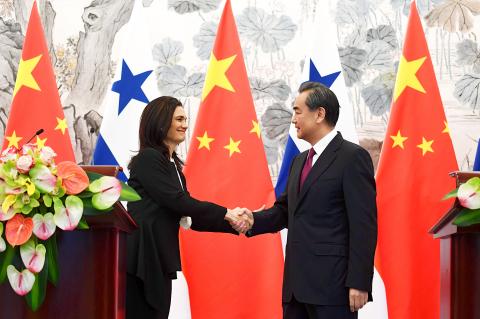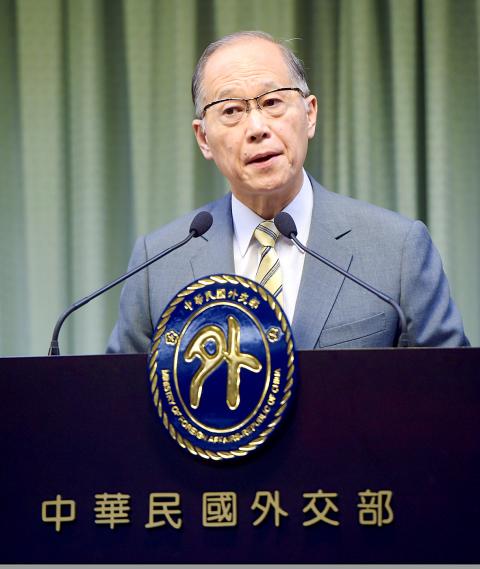Taiwan is cutting diplomatic ties with Panama after the Central American country switched diplomatic recognition from Taipei to Beijing, Minister of Foreign Affairs David Lee (李大維) announced yesterday.
“To safeguard our nation’s sovereignty and dignity, we have decided to terminate diplomatic ties with Panama immediately,” Lee said at a news conference, in which he also expressed Taiwan’s “deep anger and regret” about Panama’s decision.
Taiwan is also to halt all bilateral cooperative projects, cut all assistance to Panama, and pull out its diplomatic staff and technical missions from the country, Lee said.

Photo: AFP
Even though the two nations had maintained diplomatic ties for more than a century, Panamanian President Juan Carlos Varela caved in to Beijing for “economic interests” and ignored Taiwan’s long-term assistance that supported its overall development, Lee said.
Lee described Panama’s diplomatic switch as “most unfriendly” and accused Panama of “deceiving the Republic of China government until the last moment.”
He said that Taipei felt a sense of “strong dissatisfaction and anger” about the move, but reaffirmed that Taipei would not engage in a contest of “checkbook diplomacy” with Beijing.

Photo: Huang Yao-cheng, Taipei Times
Taiwan also “strongly protests and condemns Beijing for luring Panama to switch diplomatic ties, squeezing Taiwan’s space in the international community and hurting Taiwanese feelings,” he said.
Taiwan’s response came after Varela announced that Panama was establishing diplomatic ties with China, saying in a televised address that it represents the “correct path for our country.”
At the Diaoyutai State Guesthouse in Beijing yesterday, Chinese Minister of Foreign Affairs Wang Yi (王毅) and Panamanian Minister of Foreign Affairs Isabel de Saint Malo signed a joint communique establishing diplomatic relations, followed by a champagne toast.
Wang said he was sure relations between the two countries would have a “bright future.”
De Saint Malo said she hoped the new relationship would lead to trade, investment and tourism opportunities, in particular “exporting more goods from Panama to China.”
In the joint communique, Panama said it would not maintain any official ties with Taiwan and also agreed to recognize that there is only “one China” and that Taiwan is part of it.
Panama’s decision leaves Taiwan with 20 diplomatic allies, 11 of which are in Latin America and the Caribbean.
The decision is widely seen as a result of China’s mounting efforts to apply pressure on Taiwan since President Tsai Ing-wen (蔡英文) took office on May 20 last year.
Lee criticized Panama for keeping Taiwan in the dark about the move, but said there had been signs of Panama’s intentions and Taiwan used every means at its disposal to keep the Central American nation from moving in that direction, without going into specific details.
One of the signs was that Panama did not announce a successor after then-Panamanian ambassador to Taiwan Alfredo Martiz Fuentes on April 30 left his post to take over as Panama’s social security chief, even though Martiz told Tsai on April 20 that bilateral relations were solid.
In addition, Ambassador to Panama Miguel Tsao (曹立傑) has not been able to present his credentials since arriving in the country in the middle of last month.
The diplomatic rift came nearly one year after Tsai visited Panama in June last year on her first state visit.
Tsai attended the inaugural ceremony of the expanded Panama Canal and witnessed Taiwan’s donation of 3,000 boxes of flu medicine to help combat an epidemic of the H1N1 flu virus.
Ties between the Republic of China (ROC) and Panama date back more than a century, to when China's Qing Dynasty established diplomatic relations with Panama on Jan. 16, 1910. The ROC continued the relationship after its founding in January 1912.
Panama is the second diplomatic ally to cut ties since Tsai took office, the first being Sao Tome and Principe, which recognized Beijing in December last year.
In March last year, China re-established official ties with the Gambia, more than two years after the small African nation cut off relations with Taiwan.
Panama has actively sought to set up ties with China in the past.
According to a US Department of State diplomatic message released by WikiLeaks, Panama tried to establish relations with Beijing in 2009 without success.
Additional reporting by AP
This story has been amended since it was first published to correct the date of the establishment of diplomatic relations with Panama.

NATIONAL SECURITY THREAT: An official said that Guan Guan’s comments had gone beyond the threshold of free speech, as she advocated for the destruction of the ROC China-born media influencer Guan Guan’s (關關) residency permit has been revoked for repeatedly posting pro-China content that threatens national security, the National Immigration Agency said yesterday. Guan Guan has said many controversial things in her videos posted to Douyin (抖音), including “the red flag will soon be painted all over Taiwan” and “Taiwan is an inseparable part of China,” while expressing hope for expedited “reunification.” The agency received multiple reports alleging that Guan Guan had advocated for armed reunification last year. After investigating, the agency last month issued a notice requiring her to appear and account for her actions. Guan Guan appeared as required,

‘NATO-PLUS’: ‘Our strategic partners in the Indo-Pacific are facing increasing aggression by the Chinese Communist Party,’ US Representative Rob Wittman said The US House of Representatives on Monday released its version of the Consolidated Appropriations Act, which includes US$1.15 billion to support security cooperation with Taiwan. The omnibus act, covering US$1.2 trillion of spending, allocates US$1 billion for the Taiwan Security Cooperation Initiative, as well as US$150 million for the replacement of defense articles and reimbursement of defense services provided to Taiwan. The fund allocations were based on the US National Defense Authorization Act for fiscal 2026 that was passed by the US Congress last month and authorized up to US$1 billion to the US Defense Security Cooperation Agency in support of the

A Vietnamese migrant worker yesterday won NT$12 million (US$379,627) on a Lunar New Year scratch card in Kaohsiung as part of Taiwan Lottery Co’s (台灣彩券) “NT$12 Million Grand Fortune” (1200萬大吉利) game. The man was the first top-prize winner of the new game launched on Jan. 6 to mark the Lunar New Year. Three Vietnamese migrant workers visited a Taiwan Lottery shop on Xinyue Street in Kaohsiung’s Gangshan District (崗山), a store representative said. The player bought multiple tickets and, after winning nothing, held the final lottery ticket in one hand and rubbed the store’s statue of the Maitreya Buddha’s belly with the other,

CLASSIFIED BRIEFING: The ministry said the special budget focuses on building a comprehensive defense system and strengthening the domestic defense industry The Ministry of National Defense yesterday released information on seven categories of weapons systems to be procured under a stalled NT$1.25 trillion (US$39.57 billion) special defense budget, including precision artillery, long-range missiles, air defense anti-tank missiles and more than 200,000 uncrewed aerial vehicles (UAVs). The Executive Yuan approved a draft version of the budget on Nov. 27 last year and submitted it to the legislature for review. The legislature’s Foreign Affairs and National Defense Committee yesterday invited Minister of National Defense Wellington Koo (顧立雄) to deliver a classified briefing and answer questions at a closed-door session. Koo said he hoped to provide lawmakers